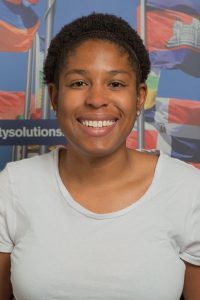
Reflections on Morocco
By Evvan Morton
My four week long study abroad trip to Morocco was the longest amount of time I have ever been out of the USA. Since I would be away for so long and traveling to many cities within Morocco, I thought it best to pack as light and as mobile as possible. I only brought carry-on baggage! This includes my Tortuga backpack and a small duffle bag as my personal item. In order to prepare for light packing, I also used packing cubes inside of my backpack. These allow you to maximize the amount of space inside the backpack. It was very difficult to pack all of the liquids I needed into 3 ounce bottles but somehow I managed it!
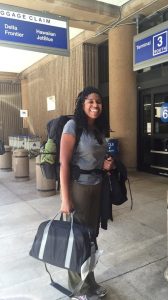
Since I decided to pack lightly, I also had to get used to hand washing my clothes regularly throughout the trip. I brought a bar of laundry detergent, a sink stopper, and a clothes line. However, most people in Morocco hand wash their clothes and dry them outside so it was easy to find clotheslines already there.
In addition to handwashing my clothes, there were many other culture shocks that I had to become accustomed to. A few of the cities we visited only had squat toilets and most of them had no toilet paper. It was important to carry a pack of tissues with you at all times.
We were only able to drink bottled water to avoid getting sick from Morocco’s tap water. I thought I had followed this rule very well, but at some point early on in the trip I drank tap water and got very sick. Thankfully I was only sick for a few days and it did not ruin my entire trip.
Another difference to American culture is that it is customary to eat with your hands in Morocco. They use a piece of bread to pick up the food that is shared in the middle of the table. So we all had eaten a lot of bread during the trip. Bread is seen as sacred in Morocco and extra bread is always saved for another meal.
One cultural change that was difficult for many of us coming from Arizona was not being able to wear shorts and tank tops. It was not as hot as Arizona in most places of Morocco, but it was hot enough to feel trapped wearing pants.
Being an African American in Morocco, I didn’t think that I would look too much different from the Moroccan people or at least I might look more like someone from another country in Africa. However, in the Marrakech Medina, one of the old town shopping areas, I received many stares as well as being called “Janet Jackson”, “Obama”, and “rasta.” At first I felt a little offended by the names, but I came to realize that they were associating me with the few things that they know about African Americans. I was also told that Moroccans have a big sense of humor and that I should not feel threatened by their comments.
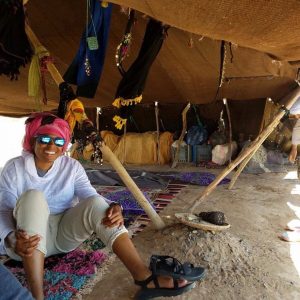
It was crazy how many different sides of Morocco we were able to witness. We started in a fancy hotel in Rabat, then stayed in a riad (house turned hotel) in the Marrakesh medina. We stayed in the home of a rural family in the Atlas Mountains as well as a girls’ boarding school in Ouarzazate. We talked to policy makers and graduate students about sustainable development and had tea with a nomad family in the Saharan Desert. The diversity of Morocco is really amazing.
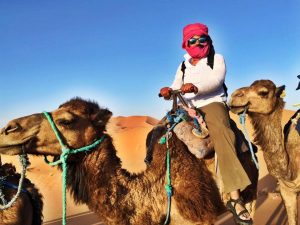
My favorite part of the trip was our camel riding and camping experience in the Saharan Desert. This also happened to be on my birthday which made it even more special. We saw shooting stars and stayed up late to see the moon rise on a sand dune. Our tour guide knew the desert so well. He led a few of us on a hike in the middle of the night. I could barely see anything, but he knew exactly where he was going.
Another interesting part of the trip was going to the hammam. This is a bath house where Moroccan’s go about once a week, usually on Friday, to clean themselves. The experience of being scrubbed down by an old Moroccan woman and seeing the dead skin roll off of your body was disgusting and incredibly refreshing at the same time.
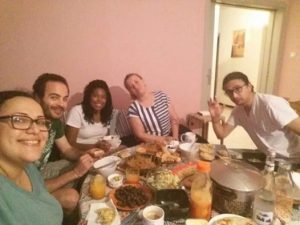
After the end of the study abroad trip, I stayed a few extra days to finish any interviews or data collection I needed for my research. These few days were also the start of Ramadan, a holiday of fasting for the Muslim faith. One of those days I decided to fast to get the full experience of Ramadan. I had the awesome opportunity of going to someone’s house that evening for iftar (breaking of the fast). I had no idea how difficult it would be to fast all day. I tried to start writing my paper for the study abroad class, but I had such a hard time focusing that I had to take a nap! But iftar was awesome! There was so much great food and I made a lot of new friends.
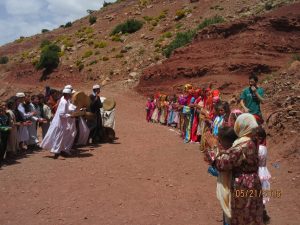
The biggest thing I have taken from my experience in Morocco is the hospitality of the Moroccan people. Whenever we went to a meeting or were invited into someone’s house, we were immediately served mint tea and cookies. We were constantly told that we were welcome in their country and were treated more like family than just acquaintances. I didn’t know any of the people that I shared the iftar meal with, but by the end of the night they were inviting me to stay with them on my next trip to Morocco.
One phrase that we heard a lot during the trip was “la shukr ala wajib” which means “no thanks necessary, it is my duty.” This phrase was spoken instead of the usual “you’re welcome” that we are used to hearing in America. I think the phrase is a great representation of the welcoming nature of Morocco. They see it as a responsibility to serve the people they encounter because that is simply how you should treat someone, with kindness and respect. It is unusual to experience such hospitality in America, but I hope to spread the same hospitality among both strangers and friends here in Arizona.
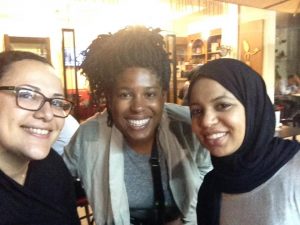
After all of the great experiences I had in Morocco, it was very difficult to say goodbye. Going to Morocco was one of the most meaningful experiences abroad I have ever had. It was great to get to meet Muslim people and dispel the stereotypes that American media has taught us to believe. It was a reminder that people are just people, no matter their ethnic or religious differences. I made some great connections while I was there and I really hope to return in the future.

